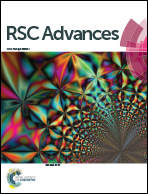Antioxidant-related and kinetic studies on the reduction effect of catechins and esterified catechins on acrylamide formation in a microwave heating model system
Abstract
The reduction effect of catechins and esterified catechins on the kinetic behavior of acrylamide formation and its correlation with the change in antioxidant properties of Maillard reaction products in an equimolar asparagine–glucose microwave heating model system was investigated. Results indicated that both catechins and esterified catechins could effectively reduce the formation of acrylamide and could achieve a maximum inhibitory rate when their addition levels were 10−9 mol L−1. Furthermore, 5′-phenolic hydroxyl and/or 3-gallate groups in the chemical structure of catechins and/or their derivatives played an important role in the reduction of acrylamide formation. Also, the reduction effect of esterified catechins was better than that of catechins. Meanwhile, inhibitory rates of acrylamide affected by either catechins or esterified catechins correlated well (R2: 0.757–0.940) with the Trolox equivalent antioxidant capacity (ΔTEAC) of Maillard reaction products measured by three different antioxidant evaluation methods, i.e. 2,2-diphenyl-1-picrylhydrazyl (DPPH), 2,2-azino-bis-3-ethylbenzothiazoline-6-sulfonic acid (ABTS), or the ferric reducing antioxidant power (FRAP) assay. The kinetic study revealed that the processes of the conversion from glucose into fructose, the asparagine–fructose reaction and the generation of acrylamide in Maillard reaction systems were all significantly suppressed, which may help to elucidate the mode of action of catechins and esterified catechins in reducing the formation of acrylamide during the Maillard reaction.


 Please wait while we load your content...
Please wait while we load your content...